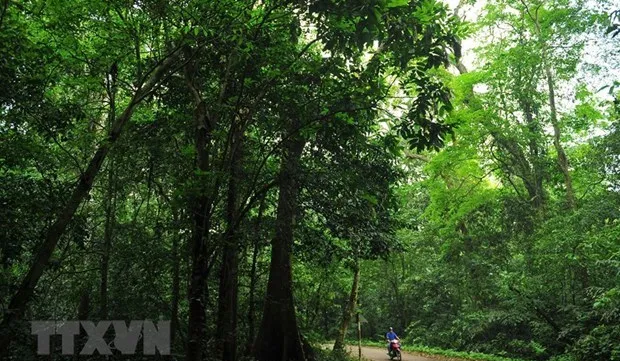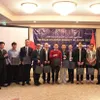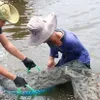Forest eco-tourism should be expanded: experts

It is necessary to remove obstacles in developing forest eco-tourism so that travelers can experience the natural environment while ensuring sustainable financial resources for forest protection, benefiting those safeguarding the forests, as well as 25 million people who rely on forests to earn their living, according to experts.
Kơ Să En Luy, a K’Ho ethnic man, has been working as a tour guide at the Centre for Eco-tourism and Environmental Education - Bidoup Nui Ba National Park since 2015.
According to Luy, his profession offers an opportunity for him to pass on knowledge and love for natural conservation to the younger generation, raising awareness on protecting the environment and natural forests.
Bidoup-Nui Ba is one of the four biodiversity centres in Vietnam and one of the world's important bird areas. It is also the second most diverse area in Vietnam in terms of Gymnospermatophyta plant species and the highest priority of the Truong Son mountain range conservation programme. However, only about 6,000 tourists visited the park in the first nine months of this year, a 10.35% increase compared with the same period last year.
Cuc Phuong National Park has been named “Asia's leading national park” by the World Travel Awards (WTA) for the fifth consecutive year. Nonetheless, it attracts only about 120,000 tourists annually. This figure is much lower than the 700,000 visitors to Thailand's Doi Inthanon National Park.
Currently, national parks primarily devise their own tours to lure visitors. However, this approach can exert considerable pressure on the parks, as they must balance between preservation and maintaining the existing biodiversity.
According to Pham Kien Cuong, Director of the Centre for Environmental Education and Services at Cuc Phuong National Park, to invest in infrastructure and services, the park must generate its own revenue as tourism activities are not covered by the State budget.
With a low number of visitors and limited revenue, it’s impossible to provide competitive wages to workers, thus, attracting high-quality employees for tourism-related work is a challenge, he said.
Director of Bidoup - Nui Ba National Park Pham Kien Cuong said he wants to popularise the park, which boasts a rich and diverse flora and fauna, within the community, adding that through understanding about nature and the biodiversity of the forests, people can protect it further.
In line with the government's directives, the Forest Protection Department is providing recommendations to the Ministry of Agriculture and Rural Development on a scheme to submit to the Prime Minister, expected to be issued in 2023, on the development of the multi-purposes values of forest ecosystems by 2030, with a vision until 2050. One of its objectives is to enhance the value of forests through eco-tourism.
Huong said that once this project is approved, it will create opportunities for businesses and national parks, such as Bidoup - Nui Ba, to showcase the diverse biodiversity of the forests to tourists and communities.
According to Trieu Van Luc, Deputy Director of the Department of Forestry, developing eco-tourism in national parks will provide significant resources to improve the livelihoods of people, especially those in buffer zones. It also presents a sustainable financial source for the operation of the management board and staff who take part in the conservation and preservation of forest ecosystems.





